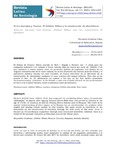Entre Asensios y Diarras: el Athletic Bilbao y la construcción de identidades

View/
Use this link to cite
http://hdl.handle.net/2183/22624
Except where otherwise noted, this item's license is described as Atribución-CompartirIgual 3.0 España
Collections
Metadata
Show full item recordTitle
Entre Asensios y Diarras: el Athletic Bilbao y la construcción de identidadesAlternative Title(s)
Between Asensios and Diarras: Athletic Bilbao and the construction of identitiesAuthor(s)
Date
2018Citation
Revista Latina de Sociología,2018,8(3):160-171.ISSN: 2253-6469
Abstract
[Resumen] El fichaje de Youssuf Diarra (nacido en Malí y llegado a Navarra con 17 años) para las categorías inferiores y el rechazo a Marco Asensio (hijo de vasco) por parte del Athletic Club han reabierto el eterno debate sobre su particular política de jugadores. Los límites de su singular interpretación de lo vasco radican en la enculturación vía cantera (modelo cívico) y el parentesco (modelo étnico). En este contexto, se busca analizar y contribuir en la discusión de la construcción de identidades mediante el caso práctico del equipo bilbaíno. Para ello se ha llevado a cabo una revisión literaria de las publicaciones en torno a la entidad vizcaína, tanto académicas como periodísticas. Asimismo, se ha realizado una etnografía con 10 aficionados no vascos a los que se les han hecho entrevistas semiestructuradas. [Abstract] Bilbao’s football team, Athletic Club, has reopened the everlasting debate about its particular “philosophy” of players after signing Youssuf Diarra (Mali-born and arrived to Navarra at the age of 17) for its academy as well as refusing Marco Asensio (son of Basque). The limits of its special understanding of what means to be Basque lay on enculturation via academy (civic model) and kinship (ethnic model). In this context, this paper wants to contribute to the discussion on the construction of identities through the case study of this team. Thus, it focuses on 10 non-Basque supporters through semi-structured interviews. Likewise, there is a review of the journals and press publications around the Biscay entity.
Keywords
Athletic Bilbao
Cantera
Diáspora
Fútbol
Identidad
País Vasco
Academy
Basque Country
Diaspora
Football
Identity
Cantera
Diáspora
Fútbol
Identidad
País Vasco
Academy
Basque Country
Diaspora
Football
Identity
Editor version
Rights
Atribución-CompartirIgual 3.0 España






